|

 Holme Roberts & Owen LLP (HRO) Holme Roberts & Owen LLP (HRO)
Holme Roberts & Owen LLP is a Denver-based law firm with more than 250 attorneys in offices in Denver, Boulder, Colorado Springs, London, Los Angeles, Munich, Salt Lake City and San Francisco. With a strong commitment to its legal work and to client service, HRO represents companies of all sizes and industries across the United States and around the world, in high profile lawsuits and business transactions. MORE
|
|
It's the Law
 |
Go To ARCHIVES: 2009; 2007-08 |
 |
ECONOMY, New & Evolving Tax Policies |
 |
Changing times create challenges, competitive advantages, David B. Strong |
 |
Raising Money for Your Startup
, Mark Weakley, Partner, HRO Boulder |
| |
ENERGY EVOLUTION Speaker Series: |
| |
Smart Grid Technology: Melody Harris & Cameron Brooks, Tendril Networks 7/27/09 |
| |
|
| |
GLOBAL Business: |
| |
Doing Business in Mexico.. Right:
Troy Braegger & Danel del Rio - 4/20/09 |
| |
Going global Arbitration Clause:
David Wilson & Josefa Sicard-Mirabal - 3/2/09 |
| |
International multi-jurisdictional & national trademark filing options, (Part 1 of 2)
Part 2: Madrid System, European Union, more
Melody Harris & Samantha Sturgis |
| |
Open Source Software
Open Source Software Synonymous with Commercial Uage, Jason Haislamaier
|
| |
PATENTS a Negative Right
Patents, Mark Yaskanin & Scott Bialecki
|
|
 757_
Patents can make or break a company
757_
Patents can make or break a company
 We all know what a patent is, right? Generally, we do. "A patent covers a new invention that has to be new and useful, novel but not obvious." Well, OK... what does that really mean? Larry interviewed Mark Yaskanin, Partner, Holme Roberts & Owen, LLP who heads up the Patent Group and
We all know what a patent is, right? Generally, we do. "A patent covers a new invention that has to be new and useful, novel but not obvious." Well, OK... what does that really mean? Larry interviewed Mark Yaskanin, Partner, Holme Roberts & Owen, LLP who heads up the Patent Group and
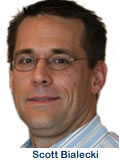 Scott Bialecki, Partner, Holme Roberts & Owen LLP who heads up the IP Litigation Group. "A patent is actually a teaching of the invention, it explains the invention and it is a limited monopoly for a period of 20 years from the filing date of the application and it gives the patentee the right to exclude others from practicing an invention that's described in a patent. People need to understand that just because they get a patent doesn't necessarily mean they can actually practice the technology covered by the patent." What we see in the energy area, are all these ideas that come up, but at different points in the cycle. That could be an idea, another point in the cycle is they've filed a provisional application - another point is that they've filed a non-provisional application or that they've actually got a granted patent and they have, eventually, some sales of the product. And of course wherever you are in that cycle, there are different values associated with that. "One area that is getting a lot of attention is the energy field. We've seen clients come to us with expectations to purchase a target company and they would like to know what this target company has in terms of Intellectual Property, is it good IP and what really is the scope of what they're buying. This also applies to companies seeking to sell. Regardless of what side of the proposition you're on it definitely helps to have a patent attorney take a look at the IP and help figure out what is it you're buying or what is it you can do to help position things better to sell." Listen for more details... Scott Bialecki, Partner, Holme Roberts & Owen LLP who heads up the IP Litigation Group. "A patent is actually a teaching of the invention, it explains the invention and it is a limited monopoly for a period of 20 years from the filing date of the application and it gives the patentee the right to exclude others from practicing an invention that's described in a patent. People need to understand that just because they get a patent doesn't necessarily mean they can actually practice the technology covered by the patent." What we see in the energy area, are all these ideas that come up, but at different points in the cycle. That could be an idea, another point in the cycle is they've filed a provisional application - another point is that they've filed a non-provisional application or that they've actually got a granted patent and they have, eventually, some sales of the product. And of course wherever you are in that cycle, there are different values associated with that. "One area that is getting a lot of attention is the energy field. We've seen clients come to us with expectations to purchase a target company and they would like to know what this target company has in terms of Intellectual Property, is it good IP and what really is the scope of what they're buying. This also applies to companies seeking to sell. Regardless of what side of the proposition you're on it definitely helps to have a patent attorney take a look at the IP and help figure out what is it you're buying or what is it you can do to help position things better to sell." Listen for more details...
Related Links:
Holme Roberts & Owen, LLP Home ||
It's the Law Channel ||
It's the Law Archives ||
US Patent and Trademark Office (USPTO) ||
Keywords: Mark Yaskanin, Scott Bialecki, Holme Roberts & Owen, Patents, IP,
Litigation, Entrepreneurs > Channel: Law 13656428 bytes 12/14/09
LISTEN
|
652_
Doing Business in Mexico can be very profitable...if done right

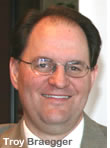 Starting a business in Mexico can easily take two plus months just to get the doors open. If you are going to start doing business in Mexico through an M&A it's a great deal trickier. Troy Braegger of Holme Roberts & Owen discussed the ins and outs with
Starting a business in Mexico can easily take two plus months just to get the doors open. If you are going to start doing business in Mexico through an M&A it's a great deal trickier. Troy Braegger of Holme Roberts & Owen discussed the ins and outs with 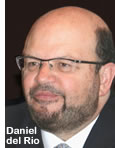 Daniel del Rio (Abogado) of Basham, Ringe y Correa, S.C. in Mexico City. They focused a great deal on the cultural differences and then went on to a macro overview of Mexico going back to the beginning of NAFTA and up through the economic challenges in 2008-09. In Daniel's presentation at the HRO offices in downtown Denver, he outlined the top M&A considerations: Historical background of M&A in Mexico; Necessary transitions; The challenges & trends; The difficulties of regulations, current business trends; Key sectors; Decision making and negotiations; Understanding client's needs; a different time pace; Power of Attorney challenges; The power of attorney differences are one example out of many that if understood and handled properly can make a significant difference in becoming a profitable center. Legally speaking there is so much more, listen now. Daniel del Rio (Abogado) of Basham, Ringe y Correa, S.C. in Mexico City. They focused a great deal on the cultural differences and then went on to a macro overview of Mexico going back to the beginning of NAFTA and up through the economic challenges in 2008-09. In Daniel's presentation at the HRO offices in downtown Denver, he outlined the top M&A considerations: Historical background of M&A in Mexico; Necessary transitions; The challenges & trends; The difficulties of regulations, current business trends; Key sectors; Decision making and negotiations; Understanding client's needs; a different time pace; Power of Attorney challenges; The power of attorney differences are one example out of many that if understood and handled properly can make a significant difference in becoming a profitable center. Legally speaking there is so much more, listen now.
Related Links: Holme Roberts & Owen LLP || It's the Law Channel || Basham, Ringe y Correa || Find It Page || Keywords: Troy Braegger, Daniel del Rio, Holme Roberts & Owen, Basham,
Ringe y Correa, Mexico, M&A, Power of Attorney, Client Needs, HRO - Channel:Law Bytes= 11793870 > 4.20.09 LISTEN
|
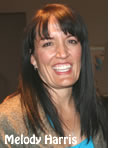 701_ Energy Evolution Speaker Series: Smart Grid Technology 701_ Energy Evolution Speaker Series: Smart Grid Technology
 Melody Harris, Senior Council, HRO Denver moderated a panel of experts discussing the latest in energy in a series called Energy Evolution Speaker Series. Larry interviewed Cameron Brooks, Senior Director of Market Development and Policy Melody Harris, Senior Council, HRO Denver moderated a panel of experts discussing the latest in energy in a series called Energy Evolution Speaker Series. Larry interviewed Cameron Brooks, Senior Director of Market Development and Policy 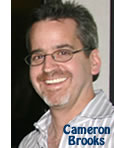 Strategy for Tendril Networks. Larry started out with, "Explain Smart Grid, we've heard it, but I'm not sure everyone understands it." Cameron replied, "The easiest way to understand what the Smart Grid is, is that it's really an overlay of information technology and control systems to our traditional electricity network. So in its highest form, it gives consumers the ability to interact with the grid. Instead of being passive consumers they can now understand what their usage is in real time and be able to modify their behavior - and I think it will enable, in the future and in many markets today, things like dynamic pricing, real time pricing to match what really happens on the supply side of electricity where prices change quite a bit. When asked, How will it help consumers make better usage of their electricity as well as saving money? Cameron had another great analogy, "In its simplest form, (and this analogy is used quite often) you can think of purchasing electricity today as though, maybe, you go to the grocery store and there are no prices on the shelf, you get what you want and maybe you're charged by weight and then at the end of the month you get a bill. You have no idea whether you filled your cart with caviar or with cottage cheese. One of the things it will do, it will enable consumers to see within their home, how their usage varies and what is causing their bill to go up quite a bit." There's much more...listen now... Strategy for Tendril Networks. Larry started out with, "Explain Smart Grid, we've heard it, but I'm not sure everyone understands it." Cameron replied, "The easiest way to understand what the Smart Grid is, is that it's really an overlay of information technology and control systems to our traditional electricity network. So in its highest form, it gives consumers the ability to interact with the grid. Instead of being passive consumers they can now understand what their usage is in real time and be able to modify their behavior - and I think it will enable, in the future and in many markets today, things like dynamic pricing, real time pricing to match what really happens on the supply side of electricity where prices change quite a bit. When asked, How will it help consumers make better usage of their electricity as well as saving money? Cameron had another great analogy, "In its simplest form, (and this analogy is used quite often) you can think of purchasing electricity today as though, maybe, you go to the grocery store and there are no prices on the shelf, you get what you want and maybe you're charged by weight and then at the end of the month you get a bill. You have no idea whether you filled your cart with caviar or with cottage cheese. One of the things it will do, it will enable consumers to see within their home, how their usage varies and what is causing their bill to go up quite a bit." There's much more...listen now...
Related Links: Tendril Networks || Holme Roberts & Owen LLP || It's the Law || Event Photos || w3w3.com Blog || Keywords: Cameron Brooks, Tendril, Energy Evolution Speaker Series, Smart Grid,
Melody Harris, HRO, Holme Roberts & Owen LLP, >> Channel: HRO/It's the Law 4043235 bytes - 7/27/09 LISTEN
|
|
|
748_
We know these licenses are enforceable
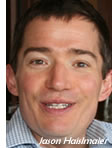
 In an interview, a number of years ago, a Red Hat representative indicated they were being derided by people in the open source world for being too commercial. This time Larry interviewed Jason Haislmaier, partner at Holme Roberts & Owen, LLC Boulder. Larry says Jason is known as the 'open source legal guru in Colorado'. Jason went onto say, "I think now you really think of open source as being synonymous with commercial usage. It wasn't always that way, Open Source had its birth as what we called 'free software' which was really academic, it was far more ideologically based around the freedom of the source code than it was looking to have a commercial application. We can charge or we cannot, but it's still a license, and we know these licenses are enforceable, which is taken for granted. It's the same thing 'proprietary software went through back in the 90s, there was a time when we didn't have a legal precedent. It wasn't until we had a court case in the mid-90's that it was actually determined, that we could actually point to a case that said that. Same thing with open source licensing until very recently. Again, answering the obvious for a lot of folks, but more importantly for companies that are staking either their futures, the money of their investors, public money in the case of public companies on open source licensed based business models. We now have that much more legal assurance and I think that's certainly one of the factors that has contributed to the increasing use of open source software...listen for more... In an interview, a number of years ago, a Red Hat representative indicated they were being derided by people in the open source world for being too commercial. This time Larry interviewed Jason Haislmaier, partner at Holme Roberts & Owen, LLC Boulder. Larry says Jason is known as the 'open source legal guru in Colorado'. Jason went onto say, "I think now you really think of open source as being synonymous with commercial usage. It wasn't always that way, Open Source had its birth as what we called 'free software' which was really academic, it was far more ideologically based around the freedom of the source code than it was looking to have a commercial application. We can charge or we cannot, but it's still a license, and we know these licenses are enforceable, which is taken for granted. It's the same thing 'proprietary software went through back in the 90s, there was a time when we didn't have a legal precedent. It wasn't until we had a court case in the mid-90's that it was actually determined, that we could actually point to a case that said that. Same thing with open source licensing until very recently. Again, answering the obvious for a lot of folks, but more importantly for companies that are staking either their futures, the money of their investors, public money in the case of public companies on open source licensed based business models. We now have that much more legal assurance and I think that's certainly one of the factors that has contributed to the increasing use of open source software...listen for more...
Related Links:
Holme Roberts & Owen, LLC Home ||
It's the Law Channel ||
SFC - Crash Course: Open Source ||
Find It ||
Keywords: Jason Haislmaier, Holme Roberts & Owen, LLC, Open Source, Licenses,
Red Hat, Business Models > Channel: Law 13735626 bytes - 11/30/09
LISTEN
|
|
733_
International multi-jurisdictional and national trademark filing options - Part 1 of 2
  What you don't know can cause you and your organization some unbelievable financial pain. Melody Harris and Samantha Sturgis, attorneys at Holme Roberts & Owen LLP (HRO), just conducted a program that had to do with 'Multi-Jurisdiction Filing Options' (The Madrid System), Community Trademarks (CTMs - European Union, 27 countries) and
What you don't know can cause you and your organization some unbelievable financial pain. Melody Harris and Samantha Sturgis, attorneys at Holme Roberts & Owen LLP (HRO), just conducted a program that had to do with 'Multi-Jurisdiction Filing Options' (The Madrid System), Community Trademarks (CTMs - European Union, 27 countries) and  Registered Community Design (RCDs - Euro union, only for last 12 mos). While Larry has owned businesses in five countries and has a registered trademark for w3w3(R) he learned a great deal. Samantha pointed out, "In the US you gain Trademark rights by using Trademarks. You don't have to register a mark because it can be protected under the common law. However we recommend that our clients using trademarks, register the trademark, and register it at the federal level." Melody added, "The first thing we want to do in thinking about filing a United States Trademark Application is whether or not somebody else might be out there already using that brand. So we recommend doing a trademark search before spending money to file an application which they may not have the ability to prosecute through to the end because someone else might be in line ahead of you. So it's really important to do at least, what we call a 'knockout' or quick search. Once we have the actual search process done, then we want to look at the application process. There are two different ways of filing applications in the U.S. You can file it on what's called a 'use base', which means you're already using the mark. Otherwise you file on what's called 'an intent to use' basis." There's much more... Registered Community Design (RCDs - Euro union, only for last 12 mos). While Larry has owned businesses in five countries and has a registered trademark for w3w3(R) he learned a great deal. Samantha pointed out, "In the US you gain Trademark rights by using Trademarks. You don't have to register a mark because it can be protected under the common law. However we recommend that our clients using trademarks, register the trademark, and register it at the federal level." Melody added, "The first thing we want to do in thinking about filing a United States Trademark Application is whether or not somebody else might be out there already using that brand. So we recommend doing a trademark search before spending money to file an application which they may not have the ability to prosecute through to the end because someone else might be in line ahead of you. So it's really important to do at least, what we call a 'knockout' or quick search. Once we have the actual search process done, then we want to look at the application process. There are two different ways of filing applications in the U.S. You can file it on what's called a 'use base', which means you're already using the mark. Otherwise you file on what's called 'an intent to use' basis." There's much more...
Related Links:
Holme Roberts & Owen LLP ||
US Patent and Trademark Office ||
US Copyright Office ||
It's the Law Channel ||
Keywords: Melody Harris, Samantha Sturgis, Holme Roberts & Owen LLP (HRO), Trademark,
Copyright, Multi-Jurisdiction, Madrid System, European Union > Channel: Law 9262467 bytes 11/2/09
LISTEN
|
629_ Going global necessitates a comprehensive arbitration clause
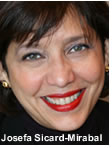   International arbitration is private dispute resolution that the parties agree that they are going to submit their disputes by contract to one or more arbitrators to resolve the dispute. The advantage to arbitration internationally is that the United States is not a party to any treaty with anybody, not even Canada, which would make our court judgments enforceable abroad. For that reason international arbitration is crucial. “International Arbitration is crucial for business today!” David Wilson, Holme Roberts & Owen partner with guest Josefa Sicard-Mirabal, International Chamber of Commerce (ICC). Josefa went onto explain, "There is no international commercial court of compulsory jurisdiction that would allow us to go to it to resolve our disputes. So, international arbitration comes to level the playing field. You don’t go to anyone’s specific court, but you create a private court where you select the arbitrators, and under certain rules of arbitration, you run the process. ICC advises that from the beginning, you insert an arbitration clause." Listen for specific insights... International arbitration is private dispute resolution that the parties agree that they are going to submit their disputes by contract to one or more arbitrators to resolve the dispute. The advantage to arbitration internationally is that the United States is not a party to any treaty with anybody, not even Canada, which would make our court judgments enforceable abroad. For that reason international arbitration is crucial. “International Arbitration is crucial for business today!” David Wilson, Holme Roberts & Owen partner with guest Josefa Sicard-Mirabal, International Chamber of Commerce (ICC). Josefa went onto explain, "There is no international commercial court of compulsory jurisdiction that would allow us to go to it to resolve our disputes. So, international arbitration comes to level the playing field. You don’t go to anyone’s specific court, but you create a private court where you select the arbitrators, and under certain rules of arbitration, you run the process. ICC advises that from the beginning, you insert an arbitration clause." Listen for specific insights...
Related Links: Holme Roberts & Owen LLP || ICC Home || ICC Arbitration || Josefa Sicard-Mirabal Bio || It's the Law Channel || Keywords: Josefa Sicard-Mirabal, International Chamber of Commerce,
ICC, David Wilson, Holme Roberts & Owen, Arbitration, International> Channel:CTP Bytes= 11105910 > 3.2.09 LISTEN
|
|
|
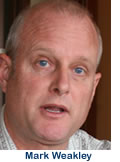 754_
Raising money for your startup
754_
Raising money for your startup
 Larry talked with Mark Weakley, Partner, Holme Roberts & Owen, LLP, Boulder about a frequently asked question from entrepreneurs. "The recurring question is, 'what kind of corporate entity should I form, a corporation or limited liability company?' There haven't been a lot of regulatory changes, nothing is driving this, but I have this conversation, every week with new clients. The questions comes up often because there are lots of opinions out there from people that entrepreneurs talk to about what they should be. I think contrary to those opinions, there aren't hard and fast rules, but there are different considerations to go over. I think that the prudent thing is for an entrepreneur to have appreciation of what the different forms of business entities are, and why certain investors are predisposed to one or the other. Then it's a matter of saying, OK, based on the facts that I know and where I think we are going, how should I set this up, now?" Larry asked, "Getting right into it, what are the differences between these C, LLC and S corporations?" After getting into the differences between a corporation and a LLC. Mark pointed out that, "Early-stage entrepreneurs want to know what form of business entity should they use, particularly if they intend to raise money be it from friends, family, angels or venture capital funds. Entrepreneurs receive as many opinions on this question as the number of people they pose the question to. Some of those facts are known now, so the hard part is the conjecture on facts that won't be known until sometime in the future." Before Mark addressed this question, "Is it true that venture capitalist investors will always require their portfolio companies to be corporations?" he detailed the primary pros and cons for choosing a LLC versus a corporation. This is very important information for entrepreneurs ...listen for more...
Larry talked with Mark Weakley, Partner, Holme Roberts & Owen, LLP, Boulder about a frequently asked question from entrepreneurs. "The recurring question is, 'what kind of corporate entity should I form, a corporation or limited liability company?' There haven't been a lot of regulatory changes, nothing is driving this, but I have this conversation, every week with new clients. The questions comes up often because there are lots of opinions out there from people that entrepreneurs talk to about what they should be. I think contrary to those opinions, there aren't hard and fast rules, but there are different considerations to go over. I think that the prudent thing is for an entrepreneur to have appreciation of what the different forms of business entities are, and why certain investors are predisposed to one or the other. Then it's a matter of saying, OK, based on the facts that I know and where I think we are going, how should I set this up, now?" Larry asked, "Getting right into it, what are the differences between these C, LLC and S corporations?" After getting into the differences between a corporation and a LLC. Mark pointed out that, "Early-stage entrepreneurs want to know what form of business entity should they use, particularly if they intend to raise money be it from friends, family, angels or venture capital funds. Entrepreneurs receive as many opinions on this question as the number of people they pose the question to. Some of those facts are known now, so the hard part is the conjecture on facts that won't be known until sometime in the future." Before Mark addressed this question, "Is it true that venture capitalist investors will always require their portfolio companies to be corporations?" he detailed the primary pros and cons for choosing a LLC versus a corporation. This is very important information for entrepreneurs ...listen for more...
Related Links:
Holme Roberts & Owen, LLP Home ||
It's the Law Channel ||
It's the Law Archives ||
Podcast Directory ||
Keywords: Mark Weakley, Holme Roberts & Owen, LLP, Corporations, S Corporation, LLC,
Entrepreneurs, Capital, Taxes > Channel: Law 15212378 bytes - 12/7/09
LISTEN
|
|
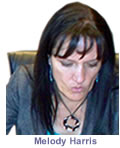 734_
International multi-jurisdictional trademark filing options - Part 2 of 2
734_
International multi-jurisdictional trademark filing options - Part 2 of 2
 (Listen: Part 2 of 2 - International) Melody Harris and Samantha Sturgis, attorneys at Holme Roberts & Owen LLP (HRO), just conducted a program that had to do with 'Multi-Jurisdiction Filing Options' (The Madrid System), Community Trademarks (CTMs - European Union, 27 countries) and Registered Community Design (RCDs - Euro union, only for last 12 months). If you're thinking of expanding your business beyond the U.S., doing
(Listen: Part 2 of 2 - International) Melody Harris and Samantha Sturgis, attorneys at Holme Roberts & Owen LLP (HRO), just conducted a program that had to do with 'Multi-Jurisdiction Filing Options' (The Madrid System), Community Trademarks (CTMs - European Union, 27 countries) and Registered Community Design (RCDs - Euro union, only for last 12 months). If you're thinking of expanding your business beyond the U.S., doing
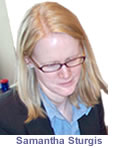 manufacturing in China or maybe trading goods in Europe, that's when you really need to think about trademark protection and that's frankly when you need to engage good council to help you through that process. Today Melody and Samantha are talking about some of the strategies to help you contain the costs involved and how you protect your brand out in a global market. (Listen: Part 1 of 2)Samantha pointed out, "In the US you gain Trademark rights by using Trademarks. You don't have to register a mark because it can be protected under the common law. However we recommend that our clients using trademarks, register the trademark, and register it at the federal level." Melodie added, "The first thing we want to do in thinking about filing a United States Trademark Application is whether or not somebody else might be out there already using that brand. So we recommend doing a trademark search before spending money to file an application which they may not have the ability to prosecute through to the end because someone else might be in line ahead of you. So it's really important to do at least, what we call a 'knockout' or quick search. Once we have the actual search process done, then we want to look at the application process. There are two different ways of filing applications in the U.S. You can file it on what's called a 'use base', which means you're already using the mark. Otherwise you file on what's called 'an intent to use' basis." Watch out for trademark trolls. There's much more... manufacturing in China or maybe trading goods in Europe, that's when you really need to think about trademark protection and that's frankly when you need to engage good council to help you through that process. Today Melody and Samantha are talking about some of the strategies to help you contain the costs involved and how you protect your brand out in a global market. (Listen: Part 1 of 2)Samantha pointed out, "In the US you gain Trademark rights by using Trademarks. You don't have to register a mark because it can be protected under the common law. However we recommend that our clients using trademarks, register the trademark, and register it at the federal level." Melodie added, "The first thing we want to do in thinking about filing a United States Trademark Application is whether or not somebody else might be out there already using that brand. So we recommend doing a trademark search before spending money to file an application which they may not have the ability to prosecute through to the end because someone else might be in line ahead of you. So it's really important to do at least, what we call a 'knockout' or quick search. Once we have the actual search process done, then we want to look at the application process. There are two different ways of filing applications in the U.S. You can file it on what's called a 'use base', which means you're already using the mark. Otherwise you file on what's called 'an intent to use' basis." Watch out for trademark trolls. There's much more...
10104151 bytes - 11/9/09
LISTEN
|
|
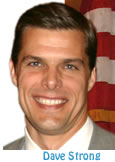 717_
Changing times creates challenges, choices and competitive advantages
717_
Changing times creates challenges, choices and competitive advantages
 "If there is one lesson that history has taught us, it's that even in the midst of what would seem like the greatest point of confusion - that is perhaps when some of the greatest competitive advantages are created." David B. Strong, Partner, Holme Roberts & Owen Denver. Dave is also the immediate past president of the Association for Corporate Growth Denver. "It's been a wonderful past year and my involvement in ACG Denver has just been a wonderful experience." Larry asked Dave about the new and evolving tax changes business is facing. "For those folks who don't deal in the technical workings of tax every day, I think we're in an interesting time because tax during difficult economic times tends to take the stage in way where it's a tool to help create and spur economic development, that's kind of the bottom-line. So we've heard a lot of noise around that, particularly in the beginning of the year when the new tax proposals came out and the Obama Administration put things into place. The question I get a lot is, As a business owner what do I need to know? What's going on in 'tax land' that I need to be aware of? The most basic way to put it, in addition to all the economic incentives that were created by the relief program, aside from tax, you know direct economic expenditures." He talked more about business taxes and incentives and went onto discuss private equity. "I get a lot of Private Equity questions around the so called 'Carried Interest Legislation' which started in middle to late 2008 and really got legs leading up to and through the election. These rules would change the way in which a lot of partnerships are taxed. And the perceived 'evil' is the way in which hedge funds. Listen for more...
"If there is one lesson that history has taught us, it's that even in the midst of what would seem like the greatest point of confusion - that is perhaps when some of the greatest competitive advantages are created." David B. Strong, Partner, Holme Roberts & Owen Denver. Dave is also the immediate past president of the Association for Corporate Growth Denver. "It's been a wonderful past year and my involvement in ACG Denver has just been a wonderful experience." Larry asked Dave about the new and evolving tax changes business is facing. "For those folks who don't deal in the technical workings of tax every day, I think we're in an interesting time because tax during difficult economic times tends to take the stage in way where it's a tool to help create and spur economic development, that's kind of the bottom-line. So we've heard a lot of noise around that, particularly in the beginning of the year when the new tax proposals came out and the Obama Administration put things into place. The question I get a lot is, As a business owner what do I need to know? What's going on in 'tax land' that I need to be aware of? The most basic way to put it, in addition to all the economic incentives that were created by the relief program, aside from tax, you know direct economic expenditures." He talked more about business taxes and incentives and went onto discuss private equity. "I get a lot of Private Equity questions around the so called 'Carried Interest Legislation' which started in middle to late 2008 and really got legs leading up to and through the election. These rules would change the way in which a lot of partnerships are taxed. And the perceived 'evil' is the way in which hedge funds. Listen for more...
Related Links:
Holme Roberts & Owen ||
It's the Law ||
HRO Taxes ||
ACG Denver Home ||
ACG Channel ||
Keywords: David Strong, Holme Roberts & Owen, Association for
Corporate Growth Denver, Tax, Competitive Advantage, Private Equity, Obama, Carried Interest Legislation, Change,
Channel: HRO - It's the Law / ACG 11686873 bytes 9/14/09
LISTEN
|
|
| |
|
|
|
DISCLAIMER:
Unless otherwise indicated, individuals on this site are not individuals associated with Holme Roberts & Owen, LLP (“HRO”) or associated with clients of HRO.
This site is purely a public resource of general information that is intended, but not guaranteed, to be correct and complete. It is not intended to be a source of solicitation or legal advice. This information is not intended to create and receipt of it does not constitute an attorney-client relationship. The reader or listener should not rely or act upon any information in this site without seeking professional legal counsel. Qualified legal counsel should always be consulted with respect to specific facts and circumstances.
The speakers presented on this website do not intend to represent anyone who viewed this site in a state where the site fails to comply with all laws and ethical rules of that state.
This site is not sponsored or associated with any other site unless so identified.
|
|





 Daniel del Rio (Abogado) of Basham, Ringe y Correa, S.C. in Mexico City. They focused a great deal on the cultural differences and then went on to a macro overview of Mexico going back to the beginning of NAFTA and up through the economic challenges in 2008-09. In Daniel's presentation at the HRO offices in downtown Denver, he outlined the top M&A considerations: Historical background of M&A in Mexico; Necessary transitions; The challenges & trends; The difficulties of regulations, current business trends; Key sectors; Decision making and negotiations; Understanding client's needs; a different time pace; Power of Attorney challenges; The power of attorney differences are one example out of many that if understood and handled properly can make a significant difference in becoming a profitable center. Legally speaking there is so much more, listen now.
Daniel del Rio (Abogado) of Basham, Ringe y Correa, S.C. in Mexico City. They focused a great deal on the cultural differences and then went on to a macro overview of Mexico going back to the beginning of NAFTA and up through the economic challenges in 2008-09. In Daniel's presentation at the HRO offices in downtown Denver, he outlined the top M&A considerations: Historical background of M&A in Mexico; Necessary transitions; The challenges & trends; The difficulties of regulations, current business trends; Key sectors; Decision making and negotiations; Understanding client's needs; a different time pace; Power of Attorney challenges; The power of attorney differences are one example out of many that if understood and handled properly can make a significant difference in becoming a profitable center. Legally speaking there is so much more, listen now.
 Strategy for Tendril Networks. Larry started out with, "Explain Smart Grid, we've heard it, but I'm not sure everyone understands it." Cameron replied, "The easiest way to understand what the Smart Grid is, is that it's really an overlay of information technology and control systems to our traditional electricity network. So in its highest form, it gives consumers the ability to interact with the grid. Instead of being passive consumers they can now understand what their usage is in real time and be able to modify their behavior - and I think it will enable, in the future and in many markets today, things like dynamic pricing, real time pricing to match what really happens on the supply side of electricity where prices change quite a bit. When asked, How will it help consumers make better usage of their electricity as well as saving money? Cameron had another great analogy, "In its simplest form, (and this analogy is used quite often) you can think of purchasing electricity today as though, maybe, you go to the grocery store and there are no prices on the shelf, you get what you want and maybe you're charged by weight and then at the end of the month you get a bill. You have no idea whether you filled your cart with caviar or with cottage cheese. One of the things it will do, it will enable consumers to see within their home, how their usage varies and what is causing their bill to go up quite a bit." There's much more...listen now...
Strategy for Tendril Networks. Larry started out with, "Explain Smart Grid, we've heard it, but I'm not sure everyone understands it." Cameron replied, "The easiest way to understand what the Smart Grid is, is that it's really an overlay of information technology and control systems to our traditional electricity network. So in its highest form, it gives consumers the ability to interact with the grid. Instead of being passive consumers they can now understand what their usage is in real time and be able to modify their behavior - and I think it will enable, in the future and in many markets today, things like dynamic pricing, real time pricing to match what really happens on the supply side of electricity where prices change quite a bit. When asked, How will it help consumers make better usage of their electricity as well as saving money? Cameron had another great analogy, "In its simplest form, (and this analogy is used quite often) you can think of purchasing electricity today as though, maybe, you go to the grocery store and there are no prices on the shelf, you get what you want and maybe you're charged by weight and then at the end of the month you get a bill. You have no idea whether you filled your cart with caviar or with cottage cheese. One of the things it will do, it will enable consumers to see within their home, how their usage varies and what is causing their bill to go up quite a bit." There's much more...listen now...
 Registered Community Design (RCDs - Euro union, only for last 12 mos). While Larry has owned businesses in five countries and has a registered trademark for w3w3(R) he learned a great deal. Samantha pointed out, "In the US you gain Trademark rights by using Trademarks. You don't have to register a mark because it can be protected under the common law. However we recommend that our clients using trademarks, register the trademark, and register it at the federal level." Melody added, "The first thing we want to do in thinking about filing a United States Trademark Application is whether or not somebody else might be out there already using that brand. So we recommend doing a trademark search before spending money to file an application which they may not have the ability to prosecute through to the end because someone else might be in line ahead of you. So it's really important to do at least, what we call a 'knockout' or quick search. Once we have the actual search process done, then we want to look at the application process. There are two different ways of filing applications in the U.S. You can file it on what's called a 'use base', which means you're already using the mark. Otherwise you file on what's called 'an intent to use' basis." There's much more...
Registered Community Design (RCDs - Euro union, only for last 12 mos). While Larry has owned businesses in five countries and has a registered trademark for w3w3(R) he learned a great deal. Samantha pointed out, "In the US you gain Trademark rights by using Trademarks. You don't have to register a mark because it can be protected under the common law. However we recommend that our clients using trademarks, register the trademark, and register it at the federal level." Melody added, "The first thing we want to do in thinking about filing a United States Trademark Application is whether or not somebody else might be out there already using that brand. So we recommend doing a trademark search before spending money to file an application which they may not have the ability to prosecute through to the end because someone else might be in line ahead of you. So it's really important to do at least, what we call a 'knockout' or quick search. Once we have the actual search process done, then we want to look at the application process. There are two different ways of filing applications in the U.S. You can file it on what's called a 'use base', which means you're already using the mark. Otherwise you file on what's called 'an intent to use' basis." There's much more...



 manufacturing in China or maybe trading goods in Europe, that's when you really need to think about trademark protection and that's frankly when you need to engage good council to help you through that process. Today Melody and Samantha are talking about some of the strategies to help you contain the costs involved and how you protect your brand out in a global market. (Listen: Part 1 of 2)Samantha pointed out, "In the US you gain Trademark rights by using Trademarks. You don't have to register a mark because it can be protected under the common law. However we recommend that our clients using trademarks, register the trademark, and register it at the federal level." Melodie added, "The first thing we want to do in thinking about filing a United States Trademark Application is whether or not somebody else might be out there already using that brand. So we recommend doing a trademark search before spending money to file an application which they may not have the ability to prosecute through to the end because someone else might be in line ahead of you. So it's really important to do at least, what we call a 'knockout' or quick search. Once we have the actual search process done, then we want to look at the application process. There are two different ways of filing applications in the U.S. You can file it on what's called a 'use base', which means you're already using the mark. Otherwise you file on what's called 'an intent to use' basis." Watch out for trademark trolls. There's much more...
manufacturing in China or maybe trading goods in Europe, that's when you really need to think about trademark protection and that's frankly when you need to engage good council to help you through that process. Today Melody and Samantha are talking about some of the strategies to help you contain the costs involved and how you protect your brand out in a global market. (Listen: Part 1 of 2)Samantha pointed out, "In the US you gain Trademark rights by using Trademarks. You don't have to register a mark because it can be protected under the common law. However we recommend that our clients using trademarks, register the trademark, and register it at the federal level." Melodie added, "The first thing we want to do in thinking about filing a United States Trademark Application is whether or not somebody else might be out there already using that brand. So we recommend doing a trademark search before spending money to file an application which they may not have the ability to prosecute through to the end because someone else might be in line ahead of you. So it's really important to do at least, what we call a 'knockout' or quick search. Once we have the actual search process done, then we want to look at the application process. There are two different ways of filing applications in the U.S. You can file it on what's called a 'use base', which means you're already using the mark. Otherwise you file on what's called 'an intent to use' basis." Watch out for trademark trolls. There's much more...